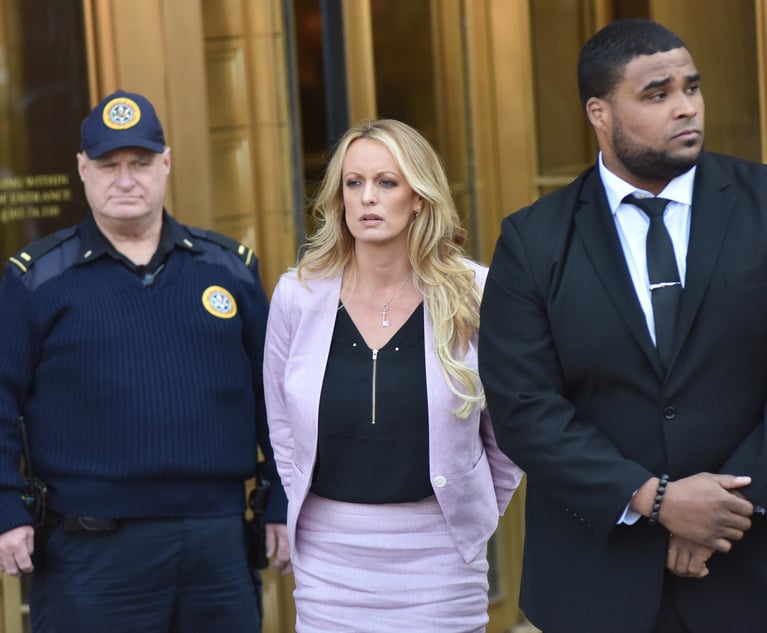Immunity for Gun Makers Impedes Needed Reforms
Last year saw the most mass killings in the United States since USA Today began tracking them in 2006.
February 02, 2018 at 12:58 PM
3 minute read

This past December, which marked the fifth anniversary of the Sandy Hook Massacre, also brought another grim milestone. The year saw the most mass killings in the United States since USA Today began tracking them in 2006. Mentally unstable assailants in Las Vegas, Nevada and Sutherland, Texas—wielding assault weapons such as the one used in Newtown—tipped last year's total number of dead in these incidents to 208.
Hedge fund Cerberus purchased Bushmaster Firearms International in 2006 to begin building a firearms conglomerate. Bushmaster manufactured the AR-15 that Adam Lanza used to kill 26 people at Sandy Hook Elementary School. The weapon's design is the basis for the M16, the standard rifle of the U.S. military. Its major attribute is its ability to fire rapidly, with devastating force, requiring little skill or training. Using the weapon, Lanza fired more than 150 rounds, killing 20 first-graders, six adults and himself, in just five minutes.
In marketing the AR-15, Bushmaster emphasizes that it is a military-grade “combat” weapon like those used by Army Rangers, Navy Seals, and other elite forces. AR-15s are also prominently featured in first-person shooter games popular with many young men, including Lanza. Bushmaster's own documents attribute the strength in AR-15 sales to its popularity with a “younger demographic.” Bearing out its youth appeal, Adam Lanza requested and received his AR-15 as an 18th birthday present from his mother, Nancy Lanza, who he killed before going to the elementary school.
There is no conceivable hunting or self-defense need for a weapon that can discharge a 30-bullet magazine in a matter of seconds. Any other product so perfectly designed for deadly illegal results would be vulnerable to lawsuits. In fact, in 2004 Bushmaster contributed to a $2.5 million settlement after it was discovered the D.C. Beltway sniper had used an AR-15 in his attacks. But in 2005, Congress enacted to immunize gun makers from tort claims. The 2005 Protection of Lawful Commerce in Arms Act prevents almost all civil suits against those who make or sell guns.
So this uniquely dangerous product is also uniquely protected from liability for the harms inflicted by the product. The result is Bushmaster may manufacture and market the AR-15 as a mass-killing machine, with almost no fear of damage suits in the wake of mass murders.
The families of many of those killed at Sandy Hook are now suing Bushmaster for “negligent entrustment,” which is one of the few exceptions to gun-maker immunity. The Connecticut Superior Court dismissed the suit before even hearing evidence, and the case is now on appeal to the Connecticut Supreme Court. The outcome of the appeal is yet to be heard, but courts have dismissed similar suits. Negligent entrustment is a matter exclusive to state law, and torts professors from Stanford, UConn, Yale, and other schools have opined that the suit should go forward.
But even if this one suit can proceed, the PLCAA should not. We can protect the right to sell and own guns for lawful purposes without protecting the marketing of combat assault weapons to the public. Gun makers, like all other manufacturers, must be subject to the state law safeguards that usually protect the American people. If they are not held accountable, more tragedies like Sandy Hook are sure to follow.
This content has been archived. It is available through our partners, LexisNexis® and Bloomberg Law.
To view this content, please continue to their sites.
Not a Lexis Subscriber?
Subscribe Now
Not a Bloomberg Law Subscriber?
Subscribe Now
NOT FOR REPRINT
© 2025 ALM Global, LLC, All Rights Reserved. Request academic re-use from www.copyright.com. All other uses, submit a request to [email protected]. For more information visit Asset & Logo Licensing.
You Might Like
View All
The Stormy Daniels 'Hush Money' Trial: Donald Trump Should Be Very Worried
7 minute read
Shining a Light on Opposing Hate: The Palestinian Protesters Who Defended New Haven's Menorah
6 minute readTrending Stories
- 1Courts, Lawyers Press On With Business as SoCal Wildfires Rage
- 2Florida, a Political Epicenter, Is the Site of Brownstein Hyatt's 13th Office
- 3Law Firms Close Southern California Offices Amid Devastating Wildfires
- 4Lawsuit alleges racial and gender discrimination led to an Air Force contractor's death at California airfield
- 5Holland & Knight Picks Up 8 Private Wealth Lawyers in Los Angeles
Who Got The Work
Michael G. Bongiorno, Andrew Scott Dulberg and Elizabeth E. Driscoll from Wilmer Cutler Pickering Hale and Dorr have stepped in to represent Symbotic Inc., an A.I.-enabled technology platform that focuses on increasing supply chain efficiency, and other defendants in a pending shareholder derivative lawsuit. The case, filed Oct. 2 in Massachusetts District Court by the Brown Law Firm on behalf of Stephen Austen, accuses certain officers and directors of misleading investors in regard to Symbotic's potential for margin growth by failing to disclose that the company was not equipped to timely deploy its systems or manage expenses through project delays. The case, assigned to U.S. District Judge Nathaniel M. Gorton, is 1:24-cv-12522, Austen v. Cohen et al.
Who Got The Work
Edmund Polubinski and Marie Killmond of Davis Polk & Wardwell have entered appearances for data platform software development company MongoDB and other defendants in a pending shareholder derivative lawsuit. The action, filed Oct. 7 in New York Southern District Court by the Brown Law Firm, accuses the company's directors and/or officers of falsely expressing confidence in the company’s restructuring of its sales incentive plan and downplaying the severity of decreases in its upfront commitments. The case is 1:24-cv-07594, Roy v. Ittycheria et al.
Who Got The Work
Amy O. Bruchs and Kurt F. Ellison of Michael Best & Friedrich have entered appearances for Epic Systems Corp. in a pending employment discrimination lawsuit. The suit was filed Sept. 7 in Wisconsin Western District Court by Levine Eisberner LLC and Siri & Glimstad on behalf of a project manager who claims that he was wrongfully terminated after applying for a religious exemption to the defendant's COVID-19 vaccine mandate. The case, assigned to U.S. Magistrate Judge Anita Marie Boor, is 3:24-cv-00630, Secker, Nathan v. Epic Systems Corporation.
Who Got The Work
David X. Sullivan, Thomas J. Finn and Gregory A. Hall from McCarter & English have entered appearances for Sunrun Installation Services in a pending civil rights lawsuit. The complaint was filed Sept. 4 in Connecticut District Court by attorney Robert M. Berke on behalf of former employee George Edward Steins, who was arrested and charged with employing an unregistered home improvement salesperson. The complaint alleges that had Sunrun informed the Connecticut Department of Consumer Protection that the plaintiff's employment had ended in 2017 and that he no longer held Sunrun's home improvement contractor license, he would not have been hit with charges, which were dismissed in May 2024. The case, assigned to U.S. District Judge Jeffrey A. Meyer, is 3:24-cv-01423, Steins v. Sunrun, Inc. et al.
Who Got The Work
Greenberg Traurig shareholder Joshua L. Raskin has entered an appearance for boohoo.com UK Ltd. in a pending patent infringement lawsuit. The suit, filed Sept. 3 in Texas Eastern District Court by Rozier Hardt McDonough on behalf of Alto Dynamics, asserts five patents related to an online shopping platform. The case, assigned to U.S. District Judge Rodney Gilstrap, is 2:24-cv-00719, Alto Dynamics, LLC v. boohoo.com UK Limited.
Featured Firms
Law Offices of Gary Martin Hays & Associates, P.C.
(470) 294-1674
Law Offices of Mark E. Salomone
(857) 444-6468
Smith & Hassler
(713) 739-1250












